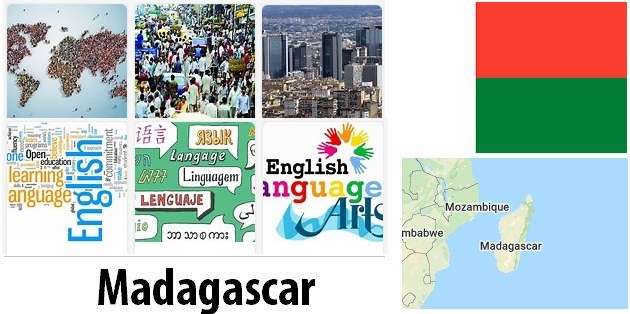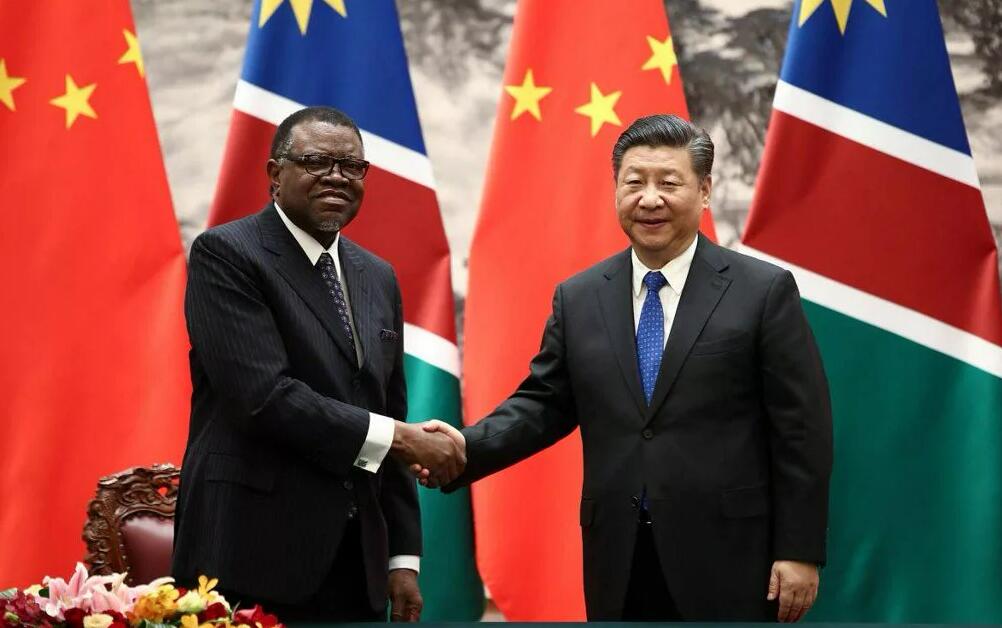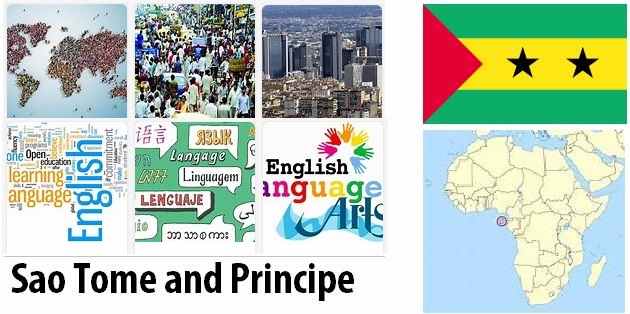Madagascar Population and Language
Madagascar’s population is of mixed origin with features from Indonesia and Africa in particular. Although the residents speak a uniform language, Malagasy, they are officially divided into 18 groups of people with their own dialects.
Madagascar’s population also includes Indian and Arabic features. In addition, there are small minorities of descendants of immigrants from Europe and Asia.
The largest population group is the marina, which comprises about a quarter of the population. In the 19th century, Merina submerged large parts of the island and now lives mainly in the central highlands.
- COUNTRYAAH.COM: Key populations estimated size and data of Madagascar, including population density of how many people per square mile. Also included are facts for population and language.
Throughout history, contradictions have regularly come to the surface between the highland population, which mainly consists of merina and betsileo, and the coastal population. The latter is denoted by the French term côtiers.
Both the highland and coastal populations are of mixed origin, but côtiers have relatively more African features while mainly merina has more Indonesian flavor. Côtiers, who live more in rural areas, feel discriminated against in society in relation to the highland population. The largest population groups among côtiers are betsimisaraka on the east coast, tsimihety in the north and antandroy in the south.
Population growth is high; four out of ten residents are under 15 years of age. Moving into rural areas is fast, leading to slum areas growing.
In search of livelihood, many move abroad. About a quarter of a million Madagascans have left the country to try to find work in other countries.
Language
Malagasy is one of the Austronesian (West Indonesian) languages. It has been mixed with African languages, a small number of Sanskrit and Arabic as well as French and English for the last 200 years.
During the 1970s, the then regime wanted to come from the French influence and made the marina dialect into the only official language. The coastal population opposed this and French therefore remained an official language. French is especially important in the administration, higher education and the tourism industry. Through a constitutional change in 2007, English also became the official language alongside French and Malagasy.
FACTS – POPULATION AND LANGUAGE
Population
18 official folk groups, of which merina, betsimisaraka and betsileo are among the largest; in addition, small groups of Europeans and Asians
Number of residents
25 570 895 (2017)
Number of residents per square kilometer
44 (2017)
Percentage of residents in the cities
36.5 percent (2017)
Nativity / birth
33.1 per 1000 residents (2016)
Mortality / mortality
6.3 per 1000 residents (2016)
POPULATION GROWTH
2.7 percent (2017)
fertility rate
4.2 number of births per woman (2016)
Percentage of women
50.1 percent (2017)
Life expectancy
66 years (2016)
Life expectancy for women
68 years (2016)
Life expectancy for men
64 years (2016)
Language
Malagasy, French and English are official languages
2014
December
National reconciliation process
President Rajaonarimampianina and four presidents meet to discuss the possibility of a national reconciliation process. They quickly agree that the country’s more than ten political prisoners should be released before the turn of the year. Five people sentenced to long prison sentences for a coup attempt against Rajoelina are pardoned.
The death penalty is abolished
Parliament voted unanimously to abolish the death penalty; As far as is known, no executions have been carried out since 1958. According to the new law, which must be approved by the president, the death penalty is replaced with life sentence work.
November
Pest epidemic is worrying
A plague epidemic has claimed 40 lives since the end of August and another 80 people have been infected. There is concern that the infection will quickly take hold in the densely populated area around Antananarivo. The contagion risk is considered to be great because the fleas that spread the disease are largely resistant to the pesticides used. Towards the end of November, two cases are reported to have been discovered in the capital.
October
Protests after the president’s arrest
Ravalomanana is arrested shortly after returning to his home country for the first time since he was deposed in the coup in 2009. He is reported to have been taken to the garrison town of Antsiranana in the north. President Rajaonarimampianina says that his predecessors have been brought “to safety” due to threats against him. Before he was arrested, Ravalomanana must have made statements to supporters who suggested that he still has political power ambitions. The AU condemns his “provocative” statements which the Union believes can be seen as questioning the country’s legally and democratically elected institutions. Ravalomanana’s wife urges the Malagasy people to “rise”. Kravall police fire tear gas at a few hundred people demonstrating their support for Ravalomanana.
July
Kolo wants to fight corruption
Prime Minister Kolo says 40 percent of the state budget is being squeezed by corruption. He says that the independent anti-corruption authority that was created in 2004 should be restructured to be able to carry out its work more efficiently.
April
Doctors become prime minister
The 70-year-old doctor Roger Kolo is appointed prime minister. He is said to have solid support in Parliament. While the prime minister’s task in Madagascar is primarily to be responsible for the government’s ongoing work and enforce the president’s decision, the World Bank had said it would not grant new loans until the country received a new prime minister. Kolo has lived abroad for over 30 years and did not return until 2013. He leads a government of 31 ministers, most of the experts or relatively unknown politicians. Only two representatives of Rajoelina’s party Mapar are included.
March
The IMF resumes cooperation
A few weeks after the change of power, the International Monetary Fund (IMF) announces that it will resume cooperation with Madagascar. After the 2009 coup, the IMF has only granted emergency aid loans, but now budget support is resumed directly to the government.
February
“War” against illegal logging
President Rajaonarimampianina “declares war” against illegal logging. He says he will personally lead the fight against the smuggling of rosewood, which has increased dramatically during the political chaos of the last five years.
January
The President takes office
January 26
Rajaonarimampianina formally assumes the office of president.
Return member of AU
At the end of January, the AU decides that Madagascar will regain its membership in the organization after being suspended since 2009.
World Bank budget support back
The World Bank announces that it can resume its budget support for Madagascar within a month. During the five-year crisis since the 2009 coup, the bank has only lent money to crisis operations.
Mapes are forced to cooperate
In the parliamentary elections, the political party With President Andry Rajoelina (Mapar), who supports Rajaonarimampianina and Rajoelina, gets the most seats but is forced to cooperate with other parties and independent members to get a majority in the legislative assembly. Former President Ravalomanana’s support party The Ravalomanana movement is the second largest.
The election result is approved
January 17
The electoral court approves the preliminary election results and officially declares Rajaonarimampianina elected president with 53.5 percent of the vote against 46.5 percent for challenger Jean-Louis Robinson. A week later, Rajoelina paves the way for the new president’s entry by formally resigning.
The Minister of Finance receives the most votes
Former Finance Minister Hery Rajaonarimampianina receives 53.5 percent of the vote, but he cannot be formally declared a winner until the Electoral Court has reviewed the over 300 election fraud complaints filed by Robinson. He urges his followers to await the official result in complete calm. After a week, Robinson says he plans to accept the court’s decision.




